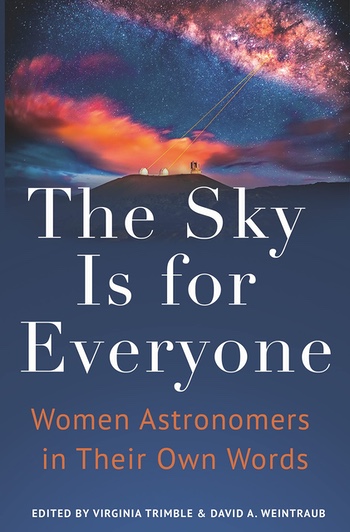Review: The Sky Is for Everyoneby Jeff Foust
|
| Though much more needs to change before equal opportunities are open to all, much progress has been made,” Trimble and Weintraub conclude. |
The conference featured 16 prize and other plenary lectures over the four days. Notably, about half involved women. The conference started last Monday morning with Jane Greaves of Cardiff University discussing the detection of phosphine in the atmosphere of Venus, followed later in the morning by Jocelyn Bell Burnell, discoverer of the first pulsar. The conference closed out Thursday afternoon with Gail Zasowski of the University of Utah talking about the Milky Way and Vicky Kaspi of McGill University (sharing the stage with Paul Scholz of the University of Toronto) on fast radio bursts.
It's a sign of the relatively recent progress women have made in astronomy. “Amazingly, through 1990 identifying and counting the women hired onto research university faculties in astronomy was fairly easy because the number remained so small,” Virginia Trimble and David A. Weintraub wrote in the opening chapter of the book The Sky Is for Everyone. Only in the last three decades has the number of women in the field grown to the point where tracking individual hires became difficult.
Most of the book is autobiographical accounts of more than three dozen women in astronomy, spanning time and geography. The oldest astronomers profiled in the book received their PhD degrees in the 1960s; the newest in 2010. Many of the astronomers are American, but others are from Europe, Asia, Africa, and Latin America. They tell similar stories, though, of their passion for astronomy despite the many obstacles they faced.
Those obstacles were particularly severe for those entering the field in the 1960s through the end of the century. Women recall professional and personal challenges, from battling an old boys’ network for jobs and securing equitable pay to facing ridicule, harassment and worse (one recalled being sexually assaulted by a “senior elected AAS officer” in an elevator at a conference; she never reported it because that person was powerful enough to ruin her career.) Another theme from the essays is the “two-body problem”: couples, both in academia (often both in the same field), trying to find jobs at the same university or at least the same area.
The essays in The Sky Is for Everyone illustrate the progress women have made in the field, although that push to equality is not complete: sexual harassment remains a problem despite greater awareness and zero-tolerance policies at conferences. “Though much more needs to change before equal opportunities are open to all, much progress has been made,” Trimble and Weintraub conclude at the end of the book. (Trimble, who earned her doctorate in astronomy in the 1960s, is among those who included their life stories in the book.) “For young women today who wish to enter the field of astronomy, the doors are more open than they have ever been, first having been pried open a crack and finally having been flung wide open by their tough and determined predecessors.”
Note: we are using a new commenting system, which may require you to create a new account.
